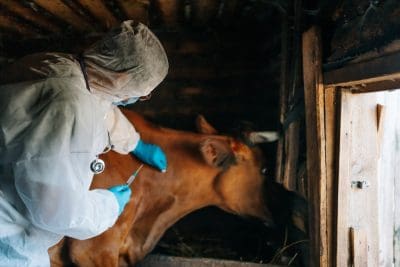Boehringer Ingelheim has been awarded a multi-year contract to continue to provide antigen and vaccine supply capability as part of Australia’s Foot and Mouth Disease (FMD) preparedness.
 FMD is a severe, highly contagious viral disease that affects cattle, pigs, sheep, goats and camelid species.
FMD is a severe, highly contagious viral disease that affects cattle, pigs, sheep, goats and camelid species.
An FMD outbreak would be disastrous for Australia’s livestock industry and could wipe out an estimated $80b from the industry over ten years.
Head of Animal Health, Boehringer Ingelheim Australia and New Zealand, Christoph Tautphaeus, said although FMD has never been detected in Australia, being ready to combat an outbreak was critically important.
“The 2022 FMD situation in Indonesia continues in a number of provinces, including Bali.
“Australia’s worldclass biosecurity system has kept the disease at bay, but we must plan for every eventuality.
“Vaccines are one brick in the wall that will help keep Australia protected and prepared in the future.”
Following a competitive tender process, Boehringer Ingelheim has been contracted by Animal Health Australia (on behalf of commonwealth, state and territory governments, and relevant livestock industries) to maintain an off-shore antigen bank and rapidly scalable vaccine manufacturing capability.
As Mr Tautphaeus explains, the contract is the continuation of a long-standing partnership to strengthen FMD preparedness.
“2024 marks two decades of Boehringer working collaboratively to ensure Australia is well prepared to respond to an outbreak of FMD, with antigen and vaccine supply capability a crucial component of any response. “
Boehringer is the global leader in FMD vaccine development and manufacturing, maintaining 13 banks around the world that can be used by a significant number of countries and organisations in the event of an outbreak,” Mr Tautphaeus said.
CEO of Animal Health Australia, Dr Samantha Allan said Boehringer Ingelheim had been awarded the fiveyear contract after a detailed assessment of the current FMD risk profile, evaluation of the antigens required for the bank, the number of doses of antigens required and the capabilities of the various international suppliers.
“Boehringer Ingelheim offered the best of all these capabilities and has been a long-term partner in supporting Australia’s livestock disease response preparedness,” Dr Allan said.
“By maintaining this capability off-shore, Australia maintains its FMD-free status which is key to market access for our livestock product exports,” Dr Allan said.
Boehringer Ingelheim Animal Health’s Regulatory Affairs Manager, Dr Carolyn Conacher, said the FMD vaccine contract has many components.
“In coordinating Australia’s FMD vaccine supply, we collaborate with Animal Health Australia, government departments, regulators, and technical advisory groups,” Dr Conacher said.
“In the event of a disease outbreak, we work closely with the Australian authorities to match the FMD strain identified as the cause of the outbreak to an antigen in the bank and move swiftly to vaccine production.
“Once the right antigen is identified, we can have vaccines ready for delivery to Australia within six days,” Dr Conacher said.
Boehringer FMD vaccine is a highly purified, high potency inactivated vaccine with potential marker properties that allow differentiation between infected and vaccinated animals (DIVA).
These vaccines induce an immune response which is different from that induced by natural infection.
DIVA-capable vaccines (such as Boehringer’s Aftopor®) allow Australia to consider emergency vaccination as part of the response strategy from the day an FMD incursion is detected and provides an option to restore the country’s FMD-free trade status through testing and surveillance without destroying vaccinated animals.
Mr Tautphaeus said Boehringer was the only antigen bank supplier with a full portfolio of strains recommended by the World Reference Laboratory.
“During Indonesia’s 2022 FMD emergency situation Boehringer was the first vaccine supplier to respond and supplied three million vaccine doses to Indonesian authorities to support their vaccination campaign,” Mr Tautphaeus said.
Asked if the vaccinations have a use-by date, a spokesperson responded to Beef Central by saying that the antigens in the bank have a minimum 5 years shelf life so they don’t need to be replaced during the life of the contract.
“Once the bank is activated and antigens are formulated into vaccines for use in an emergency, the vaccine has an 18 month shelf life.
“That’s one of the key benefits of an antigen bank as opposed to a vaccine bank. Having strategic antigen reserves also means the vaccine can be tailored to the strain causing the outbreak.”
Source: Boehringer Ingelheim
